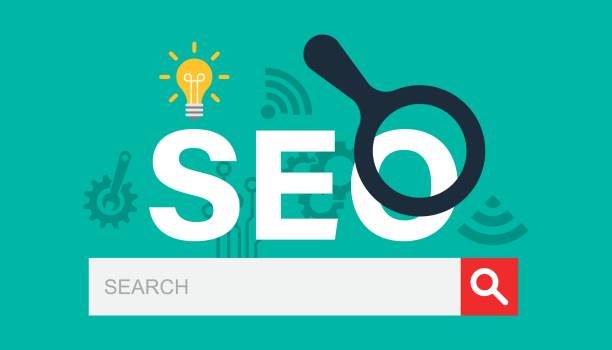An Introduction to Search Engine Optimization

In today’s digital world, visibility is of paramount importance, and this is where the concept of SEO or Search Engine Optimization comes into play.
SEO is a set of techniques and strategies performed with the aim of improving a website’s ranking in the organic search results of engines like Google, Bing, and Yahoo. The main goal of SEO is to increase traffic and attract quality traffic to your website.
This process goes beyond merely placing keywords; it involves optimizing the technical aspects of a website, producing valuable content, and building reputable connections within the web space.
If you are looking for a strong online presence, learning and applying SEO principles is crucial.
This article provides a comprehensive explanatory and educational approach to understanding and implementing SEO strategies that will help you optimize your website and achieve your digital marketing goals.
SEO is no longer an option; it is a necessity for every online business.
Without SEO, even with the best product or service, your website might get lost among a multitude of competitors.
Tired of your e-commerce website not generating as much revenue as it could? Rasaweb, specializing in professional e-commerce website design, solves this problem once and for all!
✅ Increase sales and revenue rates
✅ High loading speed and unparalleled user experience
⚡ Get a free consultation for e-commerce website design
Types of SEO and Their Importance

To gain a deeper and more comprehensive understanding of SEO, it’s essential to become familiar with its main types.
Generally, SEO is divided into three main categories: On-Page SEO, Off-Page SEO, and Technical SEO.
Each of these categories plays a unique role in improving your website’s ranking in search results.
On-Page SEO refers to all actions performed within your website and on its content.
This includes optimizing keywords, titles, meta descriptions, URL structure, image optimization, and improving content quality and readability.
The goal of On-Page SEO is to send clear signals to search engines about the topic and relevance of your page’s content.
On the other hand, Off-Page SEO involves all actions performed outside your website to improve its credibility.
Backlinks (links from other websites to your website) are the most important factor in Off-Page SEO. Social media activity, influencer marketing, and forum participation are also considered components of Off-Page SEO.
The specialized and highly critical part of SEO is Technical SEO, which deals with the technical aspects of the website and ensures that search engines can easily crawl and index your website.
This includes optimizing site speed, mobile compatibility, using an SSL certificate, site structure, and robots.txt files and sitemap.
Balance and coordination between these three types of SEO are essential for achieving desired SEO results.
Undoubtedly, a successful SEO strategy encompasses all three of these dimensions.
Keyword Research: The Heart of Content SEO

Keyword research is one of the most fundamental yet crucial steps in any successful SEO strategy.
This process helps you identify the phrases and terms your target audience uses to find products, services, or information in search engines.
Without accurate keyword research, your efforts in content creation and optimization may be fruitless.
The main goal of keyword research is to find keywords that not only have high search volume but also align with your business goals and have reasonable competitiveness.
This section provides an in-depth analytical approach to keyword discovery.
Keywords are divided into two main categories: Short-tail Keywords, which are usually one to three words long, have a high search volume but also high competitiveness (e.g., “SEO”), and Long-tail Keywords, which consist of three or more words, have lower search volume but more accurately indicate user intent and have less competitiveness (e.g., “how to improve my website’s SEO?”).
Using a combination of both types of keywords is an optimal strategy.
Several tools are available for keyword research, including Google Keyword Planner, SEMrush, Ahrefs, and KWFinder.
These tools provide information such as search volume, competitiveness, and related keywords.
Ultimately, choosing the right keywords depends on a deep understanding of your audience and their needs.
| Keyword Type | Number of Words | Search Volume | Competitiveness | User Intent | Example |
|---|---|---|---|---|---|
| Short-tail | 1-3 | High | High | General, Broad | “SEO” |
| Long-tail | +3 | Low | Low | Specific, Precise | “best SEO method for blog” |
SEO-Driven Content Creation

After identifying suitable keywords, the next step is to produce high-quality, SEO-driven content.
Content is king in SEO, and without valuable content, even the best SEO techniques cannot propel your website to high rankings.
Producing SEO-driven content means creating content that is both engaging and useful for users, and easily understandable and rankable by search engines.
This includes writing comprehensive, engaging, and in-depth texts that answer users’ questions and provide them with real value.
One type of content that can be very effective in SEO is thought-provoking content.
This type of content makes users think, sparks discussion, and encourages them to spend more time on your website looking for answers or further opinions.
Also, entertaining content can increase user engagement rates, which is a positive signal for search engines.
This content can include videos, infographics, quizzes, or even engaging stories.
For your content to be SEO-driven, you must naturally incorporate keywords without overstuffing.
Using clear headings and subheadings (H1, H2, H3, etc.), short paragraphs, lists, and images with proper descriptions (alt text) helps improve readability and SEO.
Your content should be original, unique, and comprehensive to provide more value to users.
Remember that the main goal of SEO is to improve user experience, and quality content is the backbone of an excellent user experience.
Finally, always keep your content updated to remain relevant and fresh, positively impacting your site’s SEO.
Are you dissatisfied with the low sales of your e-commerce site?
Rasaweb is your solution for having a professional and high-selling e-commerce website.
✅ Significant increase in sales and revenue
✅ Easy and enjoyable shopping experience for customers
⚡ Get a free consultation from Rasaweb right now!
Technical SEO and Its Vital Factors

Technical SEO is the foundation of any successful SEO strategy.
Without a strong technical infrastructure, even the best content and most robust link-building strategies cannot be fully optimized.
Technical SEO refers to the process of optimizing your website for better crawling and indexing by search engines. This includes ensuring website accessibility for search engine bots and improving user experience.
One of the most important factors in Technical SEO is site loading speed.
Today’s users have high expectations regarding speed, and search engines also give better rankings to faster sites.
Image optimization, caching, file compression, and using a Content Delivery Network (CDN) are among the actions that can significantly increase your site’s speed.
Another vital factor is Mobile-Friendliness.
Given the significant increase in mobile device usage for searching, Google uses a Mobile-First Indexing approach, meaning it prioritizes the mobile version of your site for ranking.
Using an SSL certificate (HTTPS) is also essential.
This certificate ensures the security of communication between the user and your website, and Google also considers it a ranking factor.
Additionally, a logical and hierarchical URL structure, using structured data (Schema Markup) to help search engines understand your content, and creating robots.txt files and XML Sitemaps are other key aspects of Technical SEO.
This section provides a comprehensive guide for enhancing your website’s technical health and strengthening its SEO foundation.
Although Technical SEO may seem hidden, it has a direct impact on your website’s visibility in search results.
Link Building and Its Role in SEO Authority

After producing high-quality content and optimizing the technical aspects of SEO, it’s time for one of the most powerful ranking factors in SEO: Link Building.
Link building refers to the process of acquiring inbound links from other websites to your website, which are called backlinks.
Search engines consider backlinks as a vote of confidence from other websites towards your content.
The greater the number and quality of your backlinks, the higher your website’s Domain Authority will be in the eyes of search engines, and consequently, you will achieve a better ranking.
However, not all links are equal.
The quality of links is far more important than their quantity. A backlink from a reputable website relevant to your field of activity is worth significantly more than dozens of links from spammy or irrelevant websites.
Link-building strategies should be based on attracting natural and high-quality links.
This includes producing highly valuable content that naturally attracts links, establishing connections with relevant bloggers and website owners, publishing news articles and case studies that can be referenced by others, and participating in specialized forums.
In addition to external links, Internal Linking also plays an important role in SEO.
Internal links help you distribute authority across different pages of your website, improve user experience, and assist search engines in understanding your website’s structure.
A comprehensive link-building strategy is a smart combination of internal and external linking, focusing on quality and relevance to elevate your website’s SEO to its peak.
Local SEO and Its Importance for Physical Businesses

Alongside the general types of SEO mentioned earlier, Local SEO has become increasingly important for businesses with a physical presence or those serving customers in a specific geographical area.
Local SEO is the optimization of your online presence to attract local customers through search engines.
This helps your business appear in search results for phrases like “coffee shop near me” or “best restaurant in Tehran.”
The heart of Local SEO is the Google My Business (GMB) profile.
Creating and optimizing this profile is the first and most crucial step for visibility in local searches and Google Maps.
Ensure that all your business information, such as Name, Address, Phone number (NAP), is accurate and consistent across the web.
This section provides an in-depth explanation of the importance of business information consistency across various platforms.
Other factors influencing Local SEO include customer reviews and ratings.
Responding to reviews, whether positive or negative, demonstrates your engagement with customers and your valuing their feedback, which can improve your ranking in local results.
Additionally, building backlinks from relevant local websites (such as local newspapers or local blogs) and ensuring your website is optimized for mobile are other important factors.
Local SEO enables businesses to increase physical traffic and convert potential customers in their area into actual customers.
| Local SEO Factor | Description | Importance |
|---|---|---|
| Google My Business (GMB) Profile | Accurate and complete business information, images, opening hours. | Very High (Main factor for visibility in maps and local results) |
| Customer Reviews and Ratings | Quantity and quality of reviews, business responsiveness. | High (Increases credibility and trust) |
| NAP (Name, Address, Phone) Consistency | Consistency of name, address, and phone number across all platforms. | High (Increases data accuracy for search engines) |
| Local Backlinks | Links from reputable local websites to your site. | Medium to High (Increases local authority) |
SEO Tools and Performance Analysis

For your SEO strategies to be effective, you need continuous performance monitoring and analysis.
Fortunately, numerous SEO tools are available to help you track your progress, identify issues, and discover new opportunities.
These tools are essential for any SEO specialist or website owner looking to improve their ranking.
This section provides an analysis of the most commonly used SEO tools.
Google Analytics and Google Search Console are two free and very powerful tools from Google.
Google Analytics allows you to monitor website traffic, user behavior, traffic sources, and conversion rates.
This information is crucial for understanding how users interact with your website.
Google Search Console also provides valuable insights into how your website appears in search results, the keywords users use to find you, indexing issues, and the SEO health status of your website.
In addition to Google’s free tools, there are powerful paid tools like SEMrush and Ahrefs.
These tools provide advanced capabilities such as competitor analysis, deeper keyword research, backlink checking, and ranking tracking.
By using these tools, you can fully monitor your website’s SEO performance and make data-driven decisions.
Regular analysis of data and reports helps you continuously adjust and improve your SEO strategy, ensuring that your efforts lead to desired results.
SEO tools are your powerful arm on the path to optimization.
Did you know that 94% of users’ first impressions of a business are related to its website design? With professional corporate website design by **Rasaweb**, transform this initial impression into an opportunity for growth.
✅ Attract more customers and increase sales
✅ Build credibility and trust in the audience’s eyes⚡ Get a free website design consultation!
The Future of SEO and Algorithm Developments

The world of SEO is not static and is constantly evolving.
Search engines, especially Google, continuously update their algorithms to provide the best and most relevant results to users.
Understanding these developments and predicting future trends is essential for maintaining your website’s ranking.
This section examines some of the most important future trends in SEO and how to adapt to them, covering important news in this field.
One of the most important emerging trends is Voice Search.
With the increasing use of voice assistants like Siri, Google Assistant, and Alexa, optimizing for voice search has become increasingly important.
This type of search is typically longer and more conversational, so your content should answer full questions.
Artificial Intelligence (AI) will also play a significant role in the future of SEO.
Google’s algorithms, such as RankBrain and BERT, use AI to better understand user intent and content meaning.
This means a greater emphasis on natural, high-quality, and useful content rather than content optimized solely for keywords.
The concept of E-A-T (Expertise, Authoritativeness, Trustworthiness) has also gained more importance.
Google looks for websites whose content is produced by experts, is authoritative, and trustworthy.
This is especially crucial for websites dealing with sensitive topics such as health and finance.
Also, Page Experience, which includes Core Web Vitals (loading speed, interactivity, and visual stability), is growing as a new ranking factor.
For success in the future of SEO, you must pay special attention to content quality, user experience, and alignment with AI-driven algorithms.
Conclusion and Continuous SEO Strategies

Throughout this article, we comprehensively examined various dimensions of SEO; from its introduction and different types to the importance of keyword research, SEO-driven content creation, technical SEO, link building, local SEO, and performance analysis tools.
We also looked at the future of SEO and algorithm developments.
What is certain is that SEO is not a one-time process but a continuous and dynamic strategy that requires constant attention and updates.
To achieve sustainable success in SEO, you need to implement a comprehensive and long-term strategy.
This strategy should include the following:
- Continuous keyword research: The market and user needs are constantly changing, so you should regularly review and update your keywords.
- Producing fresh and high-quality content: Continuously produce valuable, comprehensive, and engaging content that answers users’ questions and keeps them engaged.
- Technical website review: Ensure your website is technically sound, has high speed, and is optimized for mobile.
- Natural and quality link building: Seek to attract reputable and natural links from relevant websites.
- Continuous monitoring and analysis: Use SEO tools to track your performance and make data-driven decisions.
- Adapting to changes: Always stay informed about the latest changes in search engine algorithms and adjust your strategy accordingly.
This is a comprehensive and practical guide for anyone who wants to strengthen their online presence and benefit from the countless advantages of SEO.
By adhering to these principles and adopting an educational and patient approach, your website can achieve top rankings and attract targeted, high-quality traffic, leading to the growth and success of your business.
SEO is an investment in the future of your business.
Frequently Asked Questions
| Question | Answer |
|---|---|
| What is SEO? | SEO, or Search Engine Optimization, is a process for increasing the quality and quantity of website traffic by improving the site’s ranking in organic search results of search engines like Google. |
| What are the main types of SEO? | SEO is divided into three main categories: On-Page SEO, Off-Page SEO, and Technical SEO. |
| What does On-Page SEO include? | On-Page SEO includes optimizing elements within the website, such as keywords, Title Tags, Meta Descriptions, content, URL structure, images, and internal links. |
| What is Off-Page SEO? | Off-Page SEO refers to activities outside the website that help improve its ranking, such as Backlink Building, social media marketing, and Brand Mentions. |
| What is Technical SEO? | Technical SEO deals with optimizing the technical aspects of a website to help it be better crawled and indexed by search engines. This includes site speed, mobile-friendliness, site structure, Sitemaps, and Robots.txt files. |
| What role do Keywords play in SEO? | Keywords are phrases that users enter into search engines. Proper and targeted use of relevant keywords in content and site elements helps search engines understand the topic of your page and display it for relevant searches. |
| What is a Backlink and why is it important? | A backlink, or inbound link, is a link from one website to another website. Backlinks act as a “vote of confidence” from other sites for search engines and play an important role in the credibility and ranking improvement of a site, especially if they are from reputable sites. |
| How does quality content affect SEO? | Quality, relevant, comprehensive, and unique content not only attracts and retains users but also shows search engines that your page is valuable. This helps improve ranking, reduce Bounce Rate, and increase user time spent on the site. |
| Why is site loading speed important for SEO? | Site loading speed is an important ranking factor for Google. Faster sites provide a better user experience, have lower bounce rates, and are preferred by search engines. |
| Is SEO a one-time process? | No, SEO is a continuous and long-term process. Search engine algorithms are constantly changing, competition is increasing, and site content also needs updating. Therefore, SEO requires continuous monitoring, analysis, and optimization. |
And other services of Rasaweb Advertising Agency in the field of advertising
Smart Digital Branding: A fast and efficient solution for increasing sales, focusing on intelligent data analysis.
Smart Link Building: A professional solution for digital branding, focusing on precise audience targeting.
Smart Conversion Rate Optimization: A dedicated service for growth in customer acquisition, based on customizing user experience.
Smart Social Media: Professional optimization for customer attraction using attractive UI design.
Smart Marketing Automation: An effective tool for user interaction through user experience customization.
And over hundreds of other services in the field of internet advertising, advertising consultation, and organizational solutions
Internet Advertising | Advertising Strategy | Advertorial
Resources
Comprehensive Website SEO Guide
The Importance of Keywords in SEO
Improving Site Speed and Its Impact on SEO
Key Tips for Producing SEO-Optimized Content
? Are you ready to revolutionize your business in the digital world?
With Rasaweb Afarin Digital Marketing Agency, you no longer have to worry about your business not being seen. With our expertise in areas such as WordPress website design, Search Engine Optimization (SEO), and comprehensive digital marketing strategies, we build a strong bridge between you and your customers.
Contact us today for a free consultation and secure the digital future of your business!
📍 Tehran, Mirdamad Street, Next to Central Bank, Southern Kazeroun Alley, Ramin Alley, No. 6




